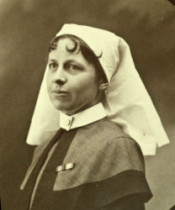On 11 September 1916 Edie mentions ‘shell shock’. Here’s what she writes:
We had a convoy of 399 in yesterday, only 70 wounded. Far the most of the sick were suffering badly from shell shock. It is sad to see them; they dither like palsied old men and talk all the time about their mates who were blown to bits or their mates who were wounded and never brought in. The whole scene is burnt into their brains and they can’t get rid of the sight of it.
One rumpled, raisin-faced old fellow said his job was to take bombs up to the bombers and sometimes, going through the trenches, he had to push past men with their arms blown off, or wounded anywhere, and they would yell at him “Don’t touch me.” But he had to get past because the fellows must have their bombs. Then he would stand on something wobbly and nearly fall down and see it was a dying or dead man half covered in mud. Once he returned to find his own officer blown to bits – leg in one place – body in another.
One man told me quite calmly, “Our Div was terribly cut up because we had to be a sacrifice to let the others advance and they did advance all right”. A Canadian said to me yesterday he didn’t know how the British Tommies had done what they had: advanced up hill and taken dug outs like underground fortresses – some as much as 60 ft deep and well fortified.
They all think the next advance will be less difficult than the last; also that Fritz’s number is up. May they be right.
This wasn’t Edie’s first mention in the diaries; there was a brief reference earlier that year on 21 June but the extract above gives a graphic example of the sort of experience so many soldiers went through.
Clearly, Edie was herself much affected by caring for soldiers experiencing shell shock and she makes three further mentions:
September 12th 1916. I sent 17 of my shell shocks off to Havre yesterday where they are to receive special treatment. Should have liked to keep them here – treating them will be very interesting.
……
The tales the men from the Somme tell are terrible. How some poor fellows go mad and some die from fright or shock and all swear terribly. One very quiet man told me swearing was not his habit, or any joy to him, but he swore as much as any man when shells were coming over; it helps one to bear it wonderfully, he said. One time they were following the 1st Warwicks and the Black Watch and had to advance over no man’s land – strewn thick with our own dead – not a square yard without a dead body on it. The Warwicks had been almost entirely wiped out and the Black Watch nearly as bad. They, as they always say. “Took what we had to.”
October 13th 1916. Sent 12 patients to England and my remaining Bosches are marked “E” so will go soon. Some of my men were very bad with shell shock. One poor child looking not a day older than 14, but who said he was 18, was very bad – too conscious and could not forget for a moment what he had seen.
The phrase ‘shellshock’ was first coined by medical officer, Charles Myers, in 1915 in an article in The Lancet and there are a number of books on the subject. I am grateful to Professors Christine Hallett and Alison Fell for recommending the following books and article on the subject:
- Ben Sheppard’s book, War of Nerves. Interesting review in TheObserver here.
- Forgotten Lunatics of the Great War by Peter Barham. Review here.
- Article by Fiona Reid – War Psychiatry here.
The extracts above are taken from Volume 3 of Edie’s diaries, all of which can be seen here.

